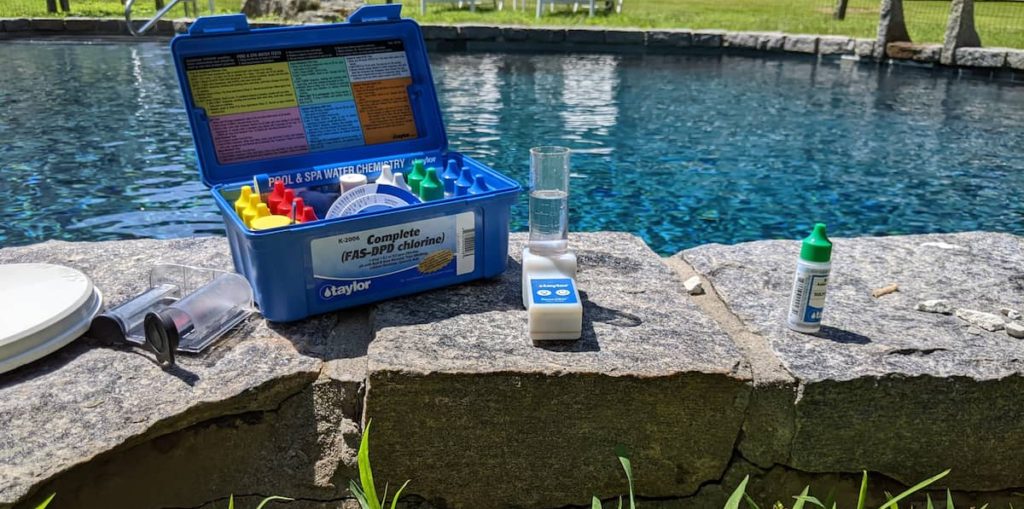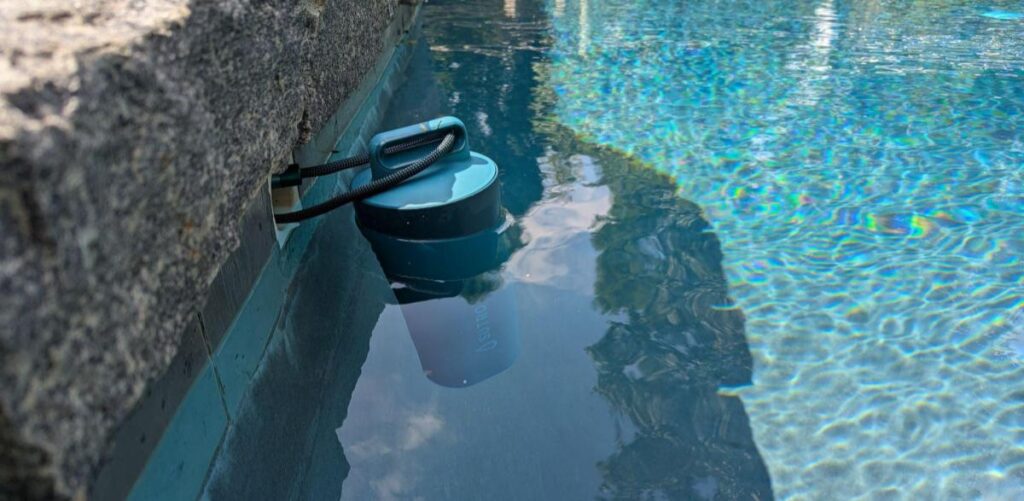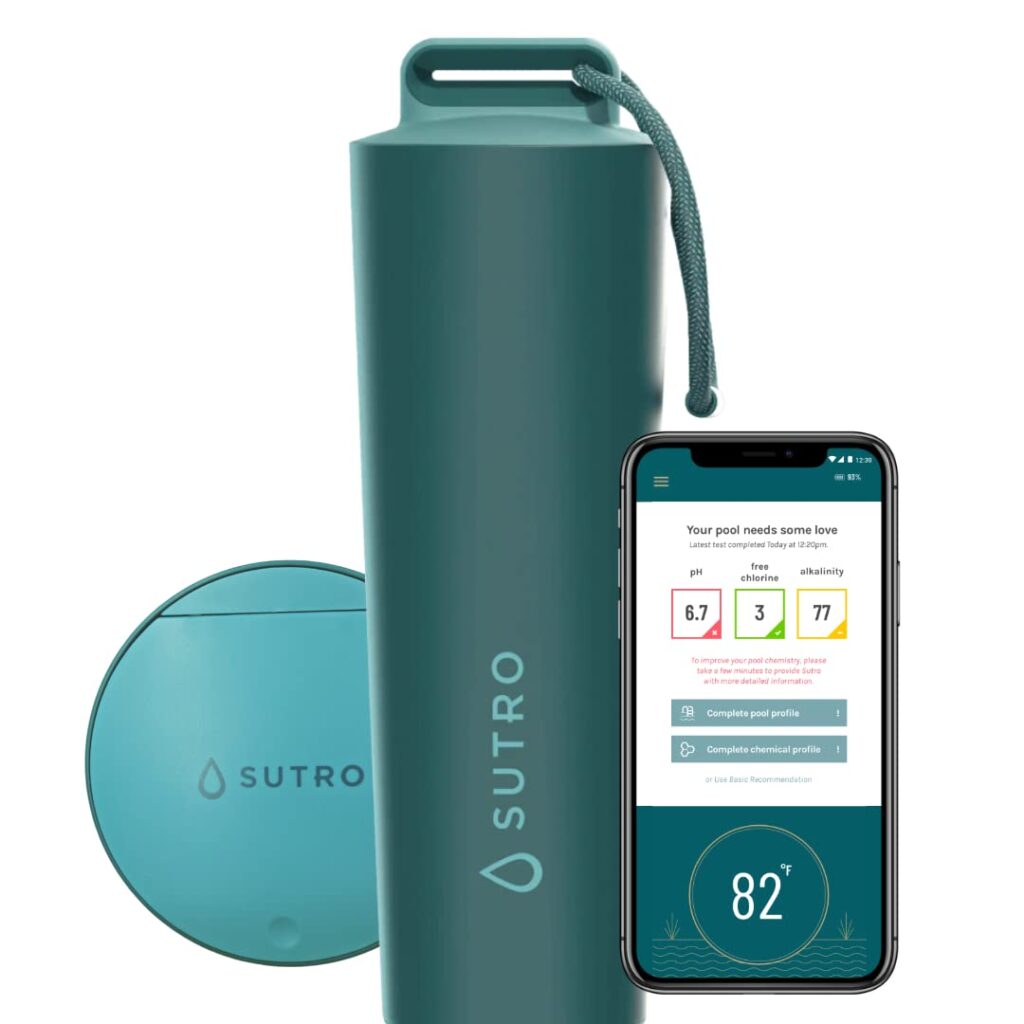Testing requires a dependable and accurate pool test kit. Without one, maintenance can be difficult. Bottom line: Don’t compromise on reliability regarding pool chemistry.
With the right test kit, you’ll be confident in knowing if the pool water is healthy.
Choose from some of the best pool test kits based on your pool’s needs, and experience the convenience of having crystal-clear pool water!
The most accurate and reliable pool testing kit.
Type of Chlorine Test: FAS-DPD
Read our full Taylor K-2006 Review.
How Each Pool Kit Was Tested
I’ve tested dozens of kits and listed what I believe are the best for various needs for both chlorine (including saltwater pools) and bromine pools.
All tests listed have been used extensively during a swim season and are reviewed without bias. Kits were used according to the manufacturer’s directions, and no kit was used more than the other. Any time a test was done, all kits were used.
Accuracy, reliability, and ease of use are key factors for reviews. Keep in mind your results may vary when using the kit day-to-day.
Each kit is also rated by the chemistry testing parameters that are included.
Here Are Best Pool Test Kits Available
Taylor K-2006

*As an Amazon Associate, I earn from qualifying purchases at no additional cost to you.
- Included Tests: Free Chlorine, Combined Chlorine, Bromine, pH (including acid and base demands), Total Alkalinity, Calcium Hardness, CYA
- Chlorine Test Type: FAS-DPD
Pros
Cons
Read the full Taylor K-2006 Review
Regarding the best overall testing kit for chlorine users, Taylor’s K-2006 kit is hard to beat. Taylor Technologies is the most trusted name in pool water testing, and there is no other complete test on the market. It tests for all the necessary chemistry parameters and includes a bromine test.
Whereas other tests provide ranges, I found that the K-2006 had more precision, making chemical additions much easier. Multiple tests in a row yielded similar results.

What sets the K-2006 apart from other kits is how it has evolved from its previous models (like the K-2005) by upgrading the way it tests free chlorine (FC).
The FAS-DPD testing method provides a much more accurate reading of FC and combined chlorine (CC). You can get accurate FC readings from 0.2 – 50 ppm!
Read: The Difference Between Chlorine Tests
This method is titration-based, meaning the tests are performed by adding drops until the color of the sample changes, which is much easier and more accurate than looking for a color range that most other tests use.
The drop method can get a little cumbersome and confusing, however. To drop, shake vial, drop, shake vial, drop (plus counting each drop) does make the K-2006 a much longer test. Using a magnetic stirrer can help speed up the process, and I would highly recommend it with this kit.
The kit has a practical carrying case that comfortably holds each of the 0.75 oz reagent bottles. However, depending on how often you test, these bottles might not last all season.
However, for those that need larger bottles, the larger version K-2006C, or complete, is stocked with 2 oz. bottles.
Provided instructions make the testing easier to comprehend, though it may take multiple tests before you don’t need to reference them. Luckily, they are located on the bottom side of the carrying case, making it very convenient to check.
Overall, the K-2006 is the kit for those pool owners who take maintenance more seriously than most.
The upfront costs of the kit, including periodic reagent refills, are quite a bit more expensive than other alternatives. However, it’s a worthwhile investment as more accurate readings can lead to more accurate chemical additions and less worry about water getting out of balance.
Taylor K-2005

*As an Amazon Associate, I earn from qualifying purchases at no additional cost to you.
- Included Tests: Free Chlorine, Combined Chlorine, Bromine, pH (including acid and base demands), Total Alkalinity, Calcium Hardness, CYA
- Chlorine Test Type: DPD
Pros
Cons
Unsurprisingly, two Taylor tests would be at the top of the list. The Taylor K-2005 kit is another great testing kit that provides all necessary tests, including bromine.
The only difference between the K-2005 and K-2006 is how it tests chlorine. It uses the DPD testing method instead of the FAS-DPD test, which makes it a bit less accurate. Combined chlorine is not directly tested but inferred through free chlorine and total chlorine tests.
I found the chlorine test a bit difficult to grasp. The color comparator is tough to differentiate, even when looking at it behind a white wall. A FAS-DPD test is vastly superior, given chlorine levels’ importance in fighting contaminants.
Otherwise, I found no difference in the testing procedures for the other parameters compared to the K-2006.
Like the K-2006, it comes with a convenient carrying case, and the test instructions are labeled on the inside of the case’s lid for easy access.
It is quite a bit cheaper than the K-2006, making it a more attractive option, though the seasonal refills can also add up.
While the FAS-DPD testing is a more reliable, the K-2005 has plenty of upside as a useful testing kit.
Sutro Pool Monitor

*As a Sutro collaboration partner, I earn from qualifying purchases at no additional cost to you.
- Included Tests: Free Chlorine, pH, TA
- Chlorine Test Type: DPD
Pros
Cons
Read the full Sutro Water Monitor Review
Disclosure: This product was provided to me to be reviewed by Sutro. I have not been compensated for this review. All opinions expressed are my own.
The world is getting more automated, and pool maintenance is no different. Wouldn’t it be nice to get accurate pool readings without stepping outside?
The Sutro Pool Monitor might be your answer! The device floats (or tethers) in your pool and gives readings 3 times per day straight into its app.

Readings are stored in the Sutro app which is super user-friendly. This allows you to compare readings throughout the week and month.
With the subscription, Sutro sends you a testing cartridge to replace every month. The cartridges include reagents from LaMotte and Taylor Technologies, both well-represented on this list!
Chemistry readings for what it tests are very accurate and reliable. Comparing the readings to the K-2006, there haven’t been many outliers or bad tests. The only anomaly that I noticed is with total alkalinity results on the day of a cartridge change.
However, it does not test for all parameters, meaning you need to supplement this device with another form of testing.
CYA, combined chlorine, and calcium hardness will not be tested. Fortunately, the app allows you to input manual tests so everything can still be in one place as you test those with another kit.
Its chlorine testing also uses the DPD method, which limits free chlorine testing to 5 ppm.
Lastly, the device is fairly expensive. Its upfront cost and monthly subscription ($29 or $39 per month depending on your package) make it the most expensive on this list.
Overall, I trusted the device to the point that I wasn’t comparing readings after a few weeks.. Although you need another testing kit, the Sutro Pool Monitor is a worthwhile investment that can save you time in the long run.
LaMotte ColorQ 2X Pro 7

*As an Amazon Associate, I earn from qualifying purchases at no additional cost to you.
- Included Tests: Free Chlorine, Total Chlorine, Bromine, pH, Total Alkalinity, Calcium Hardness, CYA
- Chlorine Test Type: DPD
Pros
Cons
For those who have trouble with color matching and prefer a simpler testing method, digital kits can help take some guessings out of the equation.
The LaMotte ColorQ 2x Pro 7 is the most well-known digital tester, and rightfully so as it is one of the more reliable digital test kits on the market. With enough reagents to perform 100+ tests, I had no issue lasting a full season without refills.
Rather than color-matching, these kits will show you a number as a reading using a photometer. I noticed how much faster it is to perform a full set of tests,
One nice aspect that is often overlooked is its Bluetooth capabilities which can conveniently store previous tests in their app!
The provided instruction manual is very helpful and provides detailed instructions on each test and how to interpret the results.
There are some slight concerns about overall accuracy. When conducting multiple tests back-to-back, I noticed that chemistry readings can vary by 10-20 ppm. For the most part, this isn’t too concerning, but it is worth mentioning.
Also, as it is a DPD chlorine test, combined chlorine again has to be inferred through free chlorine and total chlorine levels.
Digital readers are typically more expensive than other kits, and the ColorQ is no exception. Also, remember that the digital reader can break or malfunction with anything electronic. While the photometer is waterproof, exposure to the sun and water can wear it down over time.
AquaChek Select 7-in-1 Strips

*As an Amazon Associate, I earn from qualifying purchases at no additional cost to you.
- Included Tests: Total Chlorine, Free Chlorine, pH, Bromine, Alkalinity, Total Hardness, CYA
- Chlorine Test Type: Strips
Pros
Cons
A fast and convenient way to test for both chlorine and bromine pools is with AquaChek’s Select 7-in-1 Strips.
These test strips provide incredibly fast test results, and the great thing about them is it’s just one simple step: dip the stick in the pool and read the results for all seven parameters.
What I like most about AquaChek over other test strips is the ability to take pictures and store results in their app. This allows you to see how your pool behaves on a week-to-week, or even day-to-day, basis.
While the ease and convenience is positive, I have always had issues with the overall accuracy of test strips. This is why I generally recommend drop-based kits over strips.
Like with most test strips, AquaChek comes with a color comparator chart for your tested stick. I am not a fan of estimating most parameters, especially free chlorine, so it is tough to get a reliable result.
One issue in particular is with total hardness. The 7-in-1 Strips, like with all test strips, will test total hardness instead of calcium hardness. Total hardness is a combination of calcium and magnesium in water.
It is very important to get a true calcium hardness test to know how hard or soft the water is, particularly with plaster pools. Strips cannot do this which is a major downside in my opinion.
However, on the positive side, doing multiple tests in a row yielded pretty much the same results for each strip so the test itself is pretty accurate.
I still think test strips have their place in overall pool testing, and the 7-in-1 Strips are definitely a step above other strips.
Poolmaster 5-Way DPD Test Kit

*As an Amazon Associate, I earn from qualifying purchases at no additional cost to you.
- Included Tests: Chlorine, Bromine, pH (including Acid Demand), Total Alkalinity
- Chlorine Test Type: DPD (includes DPD tablets)
Pros
Cons
A much more affordable testing kit comes from Poolmaster. The 5-way DPD test kit can be used for chlorine and bromine users, and the color-coded tests are a bit easier to read than others.
As with the other tests, this kit comes with a very handy carrying case and an easy-to-understand set of directions for testing.
This kit is hard to beat in terms of ease of use and the ability to understand the testing methods. On average, I ran through the full testing parameters in about 2 to 3 minutes. However, this is largely due to what is missing from this kit.
There is no testing for calcium hardness or CYA, two important chemistry readings. Even if they don’t need to be tested as often as the others, you will need another kit to supplement those readings. This kit is not for you if you live in an area with hard water.
Also, while it uses a DPD test kit, there are DPD tablets that dissolve into the pool water, making it a little different than other DPD tests. However, this doesn’t hinder the testing in any way.
Overall, it is a solid choice if you are looking at a starter test kit or just starting your pool maintenance journey.
However, as you get more comfortable and experienced in testing, this kit will not fulfill full testing results.
Best Test Kit for Saltwater Pool Owners
Owners of saltwater pools have the added luxury of not having to worry too much about manually adding chlorine to their pools.
Even though a saltwater generator makes sanitation maintenance a bit easier, testing your water and having a proper pool balance should still be a priority.
The approach to testing shouldn’t be any different than a freshwater pool. The only difference for a saltwater pool is the need to test for salt levels.
Salt levels do not require exact reading levels. Being close enough is OK. Most salt readings provide wider ranges than most other levels.
Taylor K-1766

*As an Amazon Associate, I earn from qualifying purchases at no additional cost to you.
- Included Test: Sodium Chloride (Salt)
- Chlorine Test Type: N/A
Pros
Cons
For saltwater pool owners, a great complement to an existing testing kit is the Taylor K-1766.
Since saltwater tests don’t have to be too accurate, each drop of this test is equal to 200 ppm. And like with other Taylor tests, using the Speedstir can help speed up the drop-based test.
There is no need to buy a separate kit just for salt. A quick check salt test is all that is needed for your saltwater needs!
What Should A Pool Kit Test For?
Pool testing kits should provide a chemistry reading for all of the necessary parameters to achieve perfect water balance:
- Free Chlorine (FC)
- Combined Chlorine (CC)
- Cyanuric Acid (CYA)
- pH
- Total Alkalinity (TA)
- Calcium Hardness (CH)
Different tests are also available based on the type of sanitizer used. The most common testing kits are for chlorine pools. Saltwater pools have a separate test for salt levels in the water. Owners of a bromine pool should use a specific test for bromine levels.
When choosing a testing kit, one item to look out for is how free chlorine (FC) and combined chlorine (CC) are tested. Three testing variations exist for free chlorine levels: OTO, DPD, and FAS-DPD.
How Long Are Test Kit Reagents Good For?
All testing reagents have a shelf life. Most are effective for at least a year. However, storage conditions, not dates, are the most controlling factors regarding reagent expirations.
Ensure reagents are stored in a cool, dry place away from sunlight and in their original containers. Proper storage can prolong reagent use.
Using a SpeedStir to Speed up Taylor Tests
Once you start using drop-based tests, you’ll soon realize that swirling the bottle and dropping reagents can be time-consuming and mentally draining. Who wants to count, drop, and stir at the same time?!
That is where the Taylor SpeedStir Magnetic Stirrer comes in. This stirrer will cut your testing time in half, and the only thing you’ll need to do is drop and count. It might seem like a novelty at first, but once you start using it, you’ll wonder why it doesn’t come with Taylor kits.
Happy Testing!
As stated before, the first step to maintaining your pool is understanding what is in it. Your test kit will be the source of truth for pretty much everything regarding your water. Pretty soon, you will have the recommended levels and the necessary chemical dosages memorized, and your maintenance journey will be less maintenance and more swimming!
Frequently Asked Questions
How do I Test Pool Water Using a Testing Kit?
First, an accurate reading will require a good water sample. Most kits use reagents and a dropper-based procedure. Typically, a sample is added to a testing tube mixed with the proper reagent. It is then swirled until a color change occurs. The number of drops is then calculated as parts per million (ppm).
Are All Pool Test Kits the Same?
All testing kits work the same regardless if you have vinyl, plaster, inground, or an above-ground pool. There are no specific testing differences between your pool’s surface type.
However, there are different tests for various forms of sanitation. For instance, saltwater pool owners will want a testing kit that will provide salt levels. Bromine users should use a kit that will test for bromine levels instead of chlorine.
What Time of the Day Should I Test My Pool?
There is no specific time of the day when testing is better. Just remember that FC will burn off faster when the sun is out. So, if you want a more accurate FC level, test when the sun isn’t out, either in the morning or at night.
What is the Most Accurate Pool Test Kit?
The Taylor K-2006 is the most accurate and reliable testing kit. It uses drop-based testing that gives more precision for each chemistry parameter. It also uses FAS-DPD testing for chlorine, which is the most accurate measurement for free and combined chlorine.


